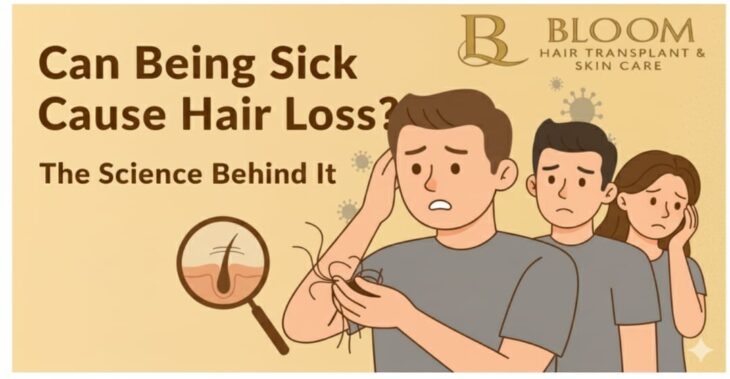
Can Being Sick Cause Hair Loss? The Science Behind It
Hair is often seen as a symbol of health and vitality, which is why losing it can be stressful. While genetics, hormones, and lifestyle choices are well-known culprits, many people wonder: does being sick affect your hair? The truth is that illnesses, whether short-term or chronic, can have a significant impact on hair growth. So, can being sick cause hair loss, and if so, how does it happen? Let’s explore the science behind the connection between sickness and shedding.
For those experiencing persistent hair loss after illness, professional guidance becomes essential. Clinics like Bloom Hair Transplant Clinic offer advanced treatments and expert care to help individuals restore their hair health, ensuring recovery is not just about feeling better but also regaining confidence in one’s appearance.
The Hair Growth Cycle
To understand hair loss when sick, it’s important to know how the hair growth cycle works. Each strand of hair passes through three key phases:
- Anagen (Growth Phase): Lasts 2–7 years, during which hair actively grows.
- Catagen (Transition Phase): A short, two-week phase where hair growth slows down.
- Telogen (Resting Phase): Lasts about 3 months; old hairs rest before shedding and being replaced by new ones.
When the body is under stress – whether physical or emotional – the natural cycle can be disrupted. This disruption often explains why being sick can affect your hair health.
How Illness Triggers Hair Loss
1. Fever and Infections
If you’ve ever noticed increased shedding after recovering from a fever, you’re not alone. High fevers, viral infections, or bacterial illnesses shock the body, pushing many hairs into the telogen phase prematurely. Weeks later, you may see hair loss when sick, as strands fall out during washing or brushing.
2. Chronic Illnesses
Conditions like diabetes, thyroid disorders, and autoimmune diseases disrupt normal body function. In these cases, can being sick cause hair loss? Absolutely. Autoimmune disorders such as alopecia areata directly attack hair follicles, while thyroid imbalances can slow growth and thin hair over time.
3. Nutrient Deficiencies During Illness
Being sick often suppresses appetite or affects nutrient absorption. Illness-related deficiencies in protein, iron, zinc, and vitamin D can weaken hair and trigger shedding. Since hair is non-essential for survival, the body prioritises vital organs during illness, making hair growth one of the first processes to suffer.
4. Medications and Treatments
It’s not just the sickness itself; treatments for certain conditions also impact hair. For example:
- Chemotherapy drugs are well-known for causing temporary but dramatic hair loss.
- Antibiotics or immunosuppressants may indirectly affect follicles by altering nutrient absorption or immune response.
Does Being Sick Affect Your Hair Permanently?
One of the biggest concerns people have is whether hair loss when sick is permanent. In most cases, the answer is no.
- Temporary Shedding (Telogen Effluvium): Illness often causes this reversible condition where large numbers of hairs enter the shedding phase. Once the illness passes, hair usually grows back within 6–9 months.
- Chronic Conditions: If sickness is long-term and untreated (like autoimmune disease or prolonged thyroid imbalance), hair thinning may persist.
- Severe Follicle Damage: In rare cases, scarring conditions or strong treatments may permanently damage follicles.
So while being sick can cause hair loss, recovery often leads to regrowth once the body returns to balance.
Tips to Manage Hair Loss When Sick
If you’re experiencing shedding due to illness, there are steps to minimise damage and encourage regrowth:
- Focus on Nutrition: Ensure adequate protein, iron, and vitamins through balanced meals or supplements recommended by a doctor.
- Gentle Hair Care: Avoid heat styling, chemical treatments, and tight hairstyles that strain weakened hair.
- Stress Reduction: Illness already stresses the body; managing emotional stress through meditation, yoga, or breathing exercises can help hair recovery.
- Medical Guidance: Consult a dermatologist or trichologist if shedding persists beyond six months. Identifying whether it’s illness-related or due to another cause is key.
- Patience and Consistency: Regrowth takes time. Consistent self-care during recovery will help restore healthy hair over the long term.
Real-Life Examples
- Post-COVID Hair Shedding: Many people reported excessive shedding a few months after recovering from COVID-19. This condition, known as post-viral telogen effluvium, highlights how being sick affects your hair long after the initial illness has passed.
- Thyroid-Related Hair Loss: Individuals with untreated hypothyroidism often notice thinning hair, particularly on the scalp and eyebrows. Once thyroid levels are managed, regrowth typically begins.
When to See a Doctor
Not all hair loss after illness is normal. Seek medical advice if:
- Shedding lasts longer than 6–9 months.
- Bald patches appear suddenly.
- Hair loss is accompanied by other symptoms like fatigue, weight changes, or skin issues.
A doctor can determine whether being sick is affecting your hair or if another underlying condition is at play.
Restoring Hair Health After Illness
So, does being sick affect your hair? Yes, illnesses can disrupt the hair growth cycle, leading to temporary or sometimes longer-term thinning. Can being sick cause hair loss? Absolutely – but in most cases, it’s a reversible process once your health stabilises. While it can be alarming to experience hair loss when sick, remember that the body prioritises healing first, and with time, nourishment, and care, your hair often recovers along with your overall health. For individuals seeking professional support, advanced treatments at trusted clinics like Bloom Hair Transplant Clinic can provide effective solutions to restore strength, volume, and confidence in your hair.

